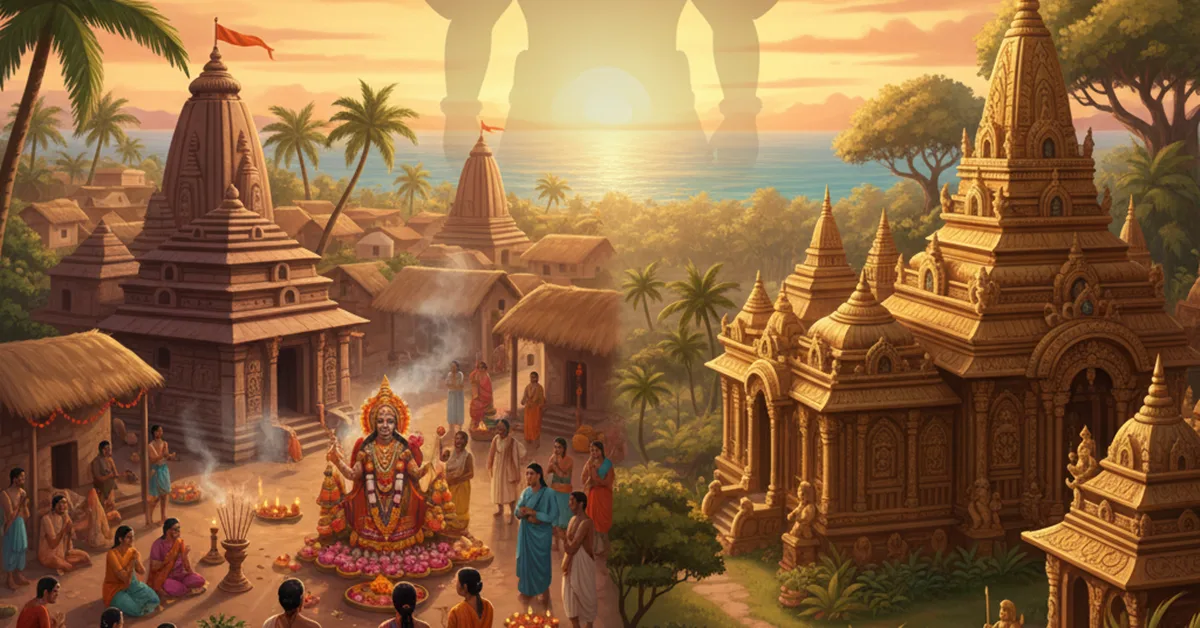Every year at Dussehra, effigies of Ravana burn across India to symbolise the triumph of good over evil. Yet, in one small village near Noida, Ravana is not demonised but venerated. This has fuelled an ongoing debate: Was Ravana born in Bisrakh (Uttar Pradesh) or in Sri Lanka?
This article explores the two competing beliefs, the mythology behind them, and what priests, politicians and locals have said about Bisrakh.
Ravana Beyond the Demon King
Ravana, the son of sage Vishrava and Kaikesi, is described in the Ramayana as a devout scholar and musician as well as a powerful ruler. His mixed parentage (Brahmin father, Rakshasa mother) is significant — it explains why his early years are often associated with Indian hermitages rather than with Lanka.
Bisrakh, Noida: Local Traditions of Ravana’s Birthplace
Bisrakh village, 30 kilometres from Delhi in Uttar Pradesh’s Gautam Buddh Nagar district, claims to be Ravana’s birthplace. The village’s name is said to derive from “Vishrava,” Ravana’s father.
Unlike the rest of India, Bisrakh villagers do not burn Ravana’s effigies during Dussehra. Instead, they perform Shraddh rituals in his honour, treating him as an ancestor and a learned king rather than a villain.
Temples and shrines in Bisrakh, including ancient Shiv Lingams, reinforce this unique reverence. The story is passed down orally, making Bisrakh one of the few places in India where Ravana is celebrated rather than condemned.
Sri Lanka: Ravana’s Golden Kingdom
On the other side of the Indian Ocean, Ravana is synonymous with Lanka, described in the Ramayana as a golden city of palaces, gardens and advanced technology like the Pushpaka Vimana.
Almost every popular retelling identifies Sri Lanka as the seat of Ravana’s power:
- Lanka was ruled by Kubera (Ravana’s half-brother) before Ravana seized it.
- The abduction of Sita and the climactic war of the Ramayana occur in Lanka.
- Sri Lanka has temples and sites dedicated to Ravana, commemorating him as a king, healer and scholar.
However, the Ramayana does not explicitly state that Ravana was born in Lanka. It only describes Lanka as his kingdom.
What People Have Actually Said About Bisrakh
Because no formal archaeological report confirms Bisrakh as Ravana’s birthplace, the most widely quoted statements come from local priests, residents, and public figures. Here is a summary:
| Person / Source | Statement on Bisrakh | Notes |
|---|---|---|
| Mahant Ram Das (Priest of Ravana Temple, Bisrakh) | “Bisrakh is the birthplace of Ravana. The Shiv Linga here is because of Brahma ji and Pulasta Muni. This is the birthplace of Vishrava, the father of Ravana, as well as Vibhishana and Kumbhakaran.” | Local religious authority; reflects village tradition, not archaeological proof. |
| Ram Das (Mahant, in other reports) | “We don’t burn Ravana effigies, he was a son of our village. He was born here and we are proud of it.” | Local tradition expressed during Dussehra. |
| Subramanian Swamy (politician & former academic) | “Ravana was born in a village near Delhi … Bisrakh.” | Statement by a public figure, not a scholarly citation. |
| Local Residents (news reports) | “Ravana was born here in our village … nothing has been more painful for us than to see effigies of Ravana burn every year.” | Shows oral tradition and communal belief. |
This table demonstrates that the Bisrakh claim is rooted in faith and community memory, not in peer-reviewed historical or archaeological studies.
Comparing the Two Claims
| Aspect | Bisrakh (India) | Sri Lanka |
|---|---|---|
| Basis of Claim | Local tradition, etymology of Vishrava’s name, rituals every Dussehra | Association with Ravana’s kingdom as per the Ramayana |
| Scriptural Evidence | No explicit verse naming Bisrakh, but descriptions of Vishrava’s hermitage in India | Lanka is described as kingdom, not birthplace |
| Cultural Practices | Villagers worship or honour Ravana; no effigy burning | Temples and tourist sites commemorate Ravana’s rule |
| Public Perception | Birthplace of Ravana | Land of Ravana’s reign |
Why This Dual Identity Persists
- Epic Transmission: The Ramayana has many regional versions with differing details.
- Symbolism: For many, Lanka represents “the distant land” rather than a literal island.
- Tourism and Tradition: Both Bisrakh and Sri Lanka have built narratives around Ravana to attract pilgrims and historians.
Cultural Impact
This dual identity influences how Dussehra is celebrated:
- Across India, Ravana’s effigies are burnt to mark good triumphing over evil.
- In Bisrakh, people hold prayers for him, seeing him as a learned ancestor.
- In Sri Lanka, legends persist about Ravana’s medical knowledge and aviation skills, with some even conducting “Ravana tours.”
Conclusion
So, where was Ravana born?
Based on local traditions and scriptural hints, Bisrakh in Uttar Pradesh is widely regarded as his birthplace, while Sri Lanka is remembered as his kingdom. Both places hold part of the puzzle — one representing his origins, the other his power.
Understanding these nuances enriches our appreciation of the Ramayana and shows how mythology can shape living traditions.
Disclaimer
This article is based on traditional beliefs, cultural practices, and interpretations of mythological texts. There is no conclusive historical or archaeological evidence verifying Ravana’s birthplace. Readers are encouraged to view the information in the context of faith, folklore and regional tradition rather than established history.

